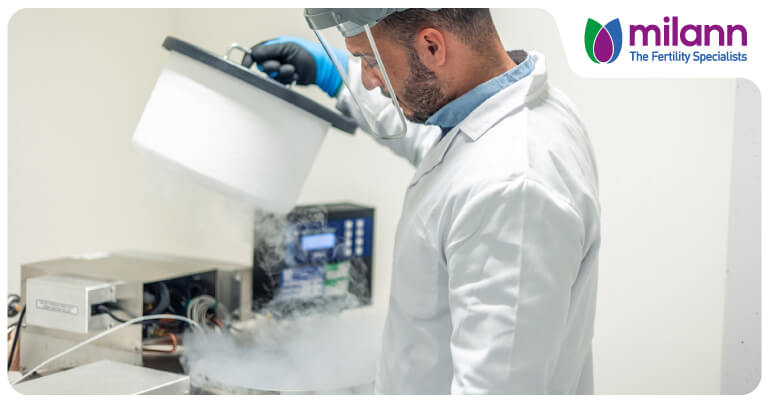If you’ve ever thought about egg freezing, you might be put off by how complex or medical it sounds. Hormone injections, retrievals, and cryopreservation can seem intimidating. But the truth is, once you understand the steps, it becomes much less overwhelming. In this blog, we
break down the egg freezing process step-by-step, so you can feel informed, confident, and in control.
Step 1: Ovarian Stimulation
The journey begins with a baseline fertility assessment to check your ovarian reserve, hormone levels, and ultrasound imaging. If everything looks good, you’ll begin a 10-14 day course of daily hormone injections. These medications stimulate your ovaries to produce multiple mature eggs instead of the single egg released during a natural cycle.
During this period, you’ll have regular ultrasounds and blood tests to monitor your response. Your fertility specialist adjusts the medication as needed to optimize results.
Step 2: Egg Retrieval
Once your eggs have reached the optimal size, your doctor will schedule a final “trigger shot” to stimulate their final maturation. Around 34 to 36 hours later, the eggs are retrieved in a short, minimally invasive procedure called oocyte pick-up (OPU). The process typically takes 20 to 30 minutes and is performed under mild anesthesia, so you’ll be comfortable throughout. There are no cuts or stitches involved; the eggs are collected via a thin needle guided by ultrasound. While you might experience mild cramping or bloating afterward, most women can resume normal activities by the next day.
Step 3: Cryopreservation and Storage
Once your eggs are retrieved, they are evaluated for maturity and quality. The mature eggs are then frozen using a rapid-freezing technique called vitrification, which helps prevent ice crystals from forming, preserving the egg’s delicate cellular structure. These frozen eggs are then stored
securely in a liquid nitrogen tank at sub-zero temperatures, where they can remain viable for up to 10 years or more.
You’ll receive a detailed report about the number of mature eggs retrieved and stored, and your fertility specialist will discuss the next steps, whether it’s annual storage renewal, planning a future IVF cycle, or keeping them as a backup for peace of mind.
How Long Can Frozen Eggs Last?
Technically, frozen eggs can be stored indefinitely. In India, most guidelines allow storage for up to 10 years, although exceptions can be made. Importantly, the success rate doesn’t decline significantly with storage time; it depends more on your age at the time of freezing. Eggs frozen
at 30 may lead to higher success at age 40 than eggs retrieved at 38. That’s why early action often pays off.
Book Your Egg Freezing Consultation at Milann
At Milann, we demystify the egg freezing process with transparent guidance, expert care, and emotional support. Whether you’re planning for the future or pausing your biological clock due to medical concerns, we’re here to help. Schedule your consultation today and take control of your
reproductive timeline.
Reviewed by
Dr. Sandhya Mishra - Consultant - Reproductive Medicine - Obstetrics and Gynecology, Indiranagar.
